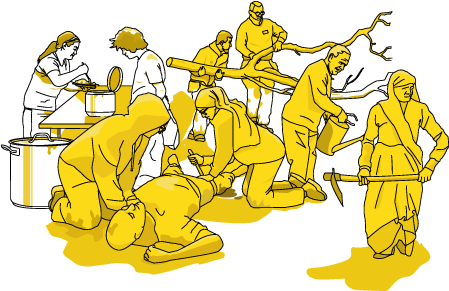






Prepping Together
Community Resilience
The Idea of "Preppa tillsammans" (Prepping Together) is that crises occur and we’d rather face them together and prepared than alone and without preparation. And by organizing we turn individual worry into action - which creates hope.At the same time we are aware that the societal structures for civil defence (warehouses stocked with food, medicine, protective gear, fuel, fertilizer and seeds) that Sweden had during the Cold War, got dismantled in the early 2000s. And today Swedens’ emergency preparedness is lacking and shows great differences depending on where in the country you are.
The question is: How do we act if the authorities haven’t had the time or possibility to act? How do we act if everything we take for granted stops functioning?
Prepping - an act of Solidarity
Individuals and households are encouraged to prepare for a time of crisis. That means taking care of basic needs such as food, water, heat, shelter, information, first aid and medicines. And that makes prepping in itself an act of solidarity - because if everyone who can, takes care of themselves, the authority can assist those with the greatest needs. And instead of having to run to the store we can focus on the interpersonal level: How are my neighbours doing? What can we do now?Disaster communities
In every disaster you will see spontaneous communities arise that address the needs at hand. It is something rooted in the essence of being human itself, individual survival has always been tied to the survival of the group. So when needed we are there for each other.
In A Paradise built in Hell, Rebecka Solnit writes that when the usual order is suspended and most systems fail, we are free to live and act the way we want to - brave, resourceful and generous.
Mutual Aid
People who prepare together are like people in general – from high school students to retirees. People who both give and receive acts of care.Cooperation among neighbours is an important part of emergency preparedness - because cooperation lets us share resources, pool knowledge and solve problems more effectively.
Between the individual level - household preparedness - and the societal level - authorities caring for the most vulnerable - there is the interpersonal level - that’s where all of us are and where we can act directly. Together, we can strengthen the unity in our communities and create the atmosphere we want there to be. Because what we create now, is also what we will see more of in a crisis. It can be the foundation for a more resilient community. The more prepared we are for the possibility that the things we take for granted can stop functioning and the more prepared we are to act and help each other out, the more safe and resilient our communities become.
Action competence
When we gather the tools, the knowledge and the will to act together our action competence increases. That action competence is something that we and especially the generation now growing up will be needing more of in the future. Increasing our knowledge and becoming used to organizing, cooperating and taking on a role in a crisis (like a medic, a cook, an organizer, a fixer or an entertainer) means being more resilient in an increasingly more unpredictable world.The reasons why people start to prepp together are many and diverse, yet a common factor is the will to act. And it is so inspiring to see the potential that we have together, all the skills and resources we own when we share them. One of the great benefits of prepping together is to realize all the skills I want to learn and how to turn worry - individual powerlessness - into hope - our shared action competence.
It all starts with asking some questions: Who do I want to be, who do we want to be, in a crisis? What do we need to become those we want to be? How can we contribute?
Start where you are
- Ask your neighbours what they feel about the state of the world and if they want to start prepping together
- Use the structures already in place (community groups on social media, tenants’ associations, village communities and so on)
- Build up community emergency preparedness (like creating a shared storage of battery powered or solar radios, gas stoves, fuel, jerricans for water, first aid kits and so on) in your area
- Start a community garden
- Learn first aid skills and psychological first aid
